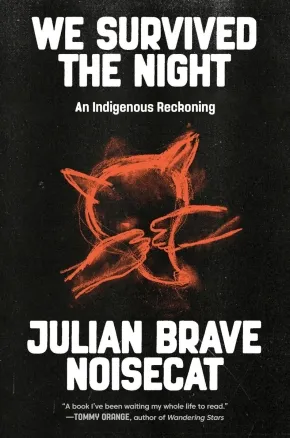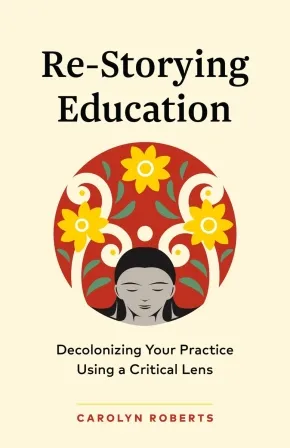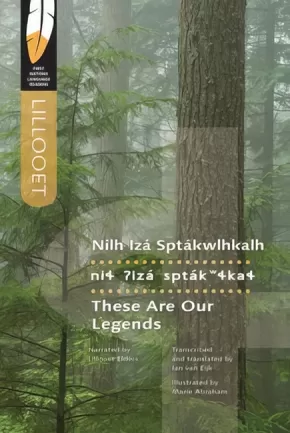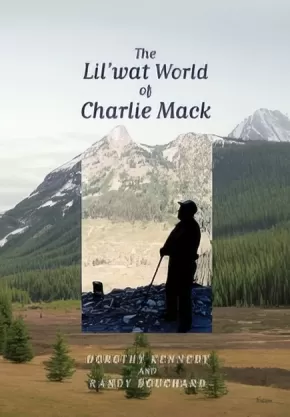
St'at'imc (Lillooet, Lil'Wat)
1
-
6
of
6 Results;
Sort By
Gino: The Fighting Spirit of Gino Odjick
$36.00
Format:
Hardcover
Text Content Territories:
Indigenous Canadian; First Nations; Anishinaabeg; Algonquin; Kitigan Zibi Anishinabeg;
Reading Level: N/A
ISBN / Barcode: 9781778402708
Synopsis:
Synopsis:
From veteran hockey reporter Patrick Johnston and Gino’s longtime friend Peter Leech comes the authorized biography of Gino Odjick.
In the 1980s and ’90s, National Hockey League games were very different from the nimble, skill-focused displays we see today. One of the greatest differences—and one of the sport’s more popular facets at the time—was the widespread presence of “enforcers”: hulking, battle-scarred players whose main task was to police the sport by chasing down and brawling with opponents who had broken unwritten codes determining which aspects of violence counted as dishonorable or unjustified.
When hard-hitting Vancouver Canucks player Gino Odjick emerged in the early 1990s, he quickly became one of the game’s most feared enforcers and revered teammates, a sign of a new era for the team, racking up 296 penalty minutes in the 45 games he played in his rookie season. Hailing from Kitigan Zibi, an Algonquin community near Maniwaki, Quebec, Gino was one of the few Indigenous players in the NHL at the time. But it was Gino’s ferocious play contrasted by his genuinely affable and openhearted personality off the ice that won him a special place in the hearts of Canucks supporters.
Yet legends often obscure the human stories behind them. Patrick Johnston and Peter Leech look beyond Gino’s legendary persona, drawing on insights from family members, friends, and teammates to recount Gino’s early years in a loving household that was always ready to welcome foster children. Gino’s father, Joe, had suffered the lonely traumas of the residential school system, and the experience had instilled a commitment in the family to those who were less fortunate.
The book also details Gino’s eventual struggles with alcohol abuse, and how he responded by taking on the role of empathetic mentor to young Indigenous people, travelling from community to community to hear their stories and offer hope. He never wavered in this role, even as he confronted serious illnesses, including chronic traumatic encephalopathy (CTE) and the rare blood disorder that he survived for years longer than expected, but that eventually led to his death at age fifty-two.
Gino is a moving tribute to a beloved hockey legend.
Reviews
"Gino was the greatest teammate; he had such a huge heart and knew his role better than anyone in the league. Gino loved being a Vancouver Canuck and gave back to the community in so many ways. He will be greatly missed by his family, friends, and fans. This book will give people insight into his remarkable life."—Geoff Courtnall
“Gino provides a compelling account of the life of a beloved Vancouver Canuck. From his humble beginnings in Quebec to NHL stardom and beyond, Odjick was dedicated to the well-being of teammates and the Indigenous community. This is an excellent tribute to an exceptional man.”—Randi Druzin, author of Between the Pipes and Behind the Mask
Additional Information
288 pages | 6.00" x 9.00" | b&w insert | Hardcover
We Survived the Night: An Indigenous Reckoning
$39.00
Format:
Hardcover
Text Content Territories:
Indigenous Canadian; First Nations; Salish; Interior Salish; Secwepemc (Shuswap); Tsq'escen' (Canim Lake Band);
Reading Level: N/A
ISBN / Barcode: 9781039001336
Synopsis:
Synopsis:
A stunning debut work of narrative nonfiction from one of the most powerful Indigenous story-tellers at work in Canada today, We Survived the Night combines investigative journalism, colonial history, Salish Coyote stories and a deeply personal father-son journey in a searing yet uplifting portrait of contemporary Indigenous life.
Born to a charismatic Sécwepemc artist from a tiny reserve in the interior of B.C. and a Jewish-Irish woman from Westchester County, N.Y., Julian Brave NoiseCat grew up in a swirl of contradictions. He was the spitting image of his dad, but was raised mostly by his white mother in the urban Native community of Oakland, CA. He became a competitive powwow dancer, travelling the North American circuit, but despite being embraced by his family, he felt like an outsider when he spent time on his home reserve—drawn to his father's world, his Indigenous heritage and identity, but struggling to make sense of his place in it. Struggling also to make sense of the swirling damage his alcoholic father—who could turn into "a brawling Indian super vigilante in the mould of Billy Jack" out to kick colonialism in the ass—had caused to those he loved.
So in his twenties, NoiseCat set out to uncover and tell the story of his father, of his Coyote People—the Interior Salish nations almost extirpated by the apocalyptic horsemen of colonialism—which soon rippled out, in five years of on-the-ground reporting, into the stories of other First Peoples in the United States and Canada, as NoiseCat attempted to counter the erasure, invisibility and misconceptions surrounding them. We Survived the Night paints a profound, inspiring and unforgettable portrait of Indigenous life, entwined with a deeply powerful reckoning between a father and a son seeking a path to a future full of possibilities—for himself and all the children of Indian Country.
Reviews
“Written in gorgeous, sparse prose, We Survived the Night reads like a novel. Told with a blistering honesty, the truth and grit create a beautifully woven coyote story we haven’t heard before. This is a love letter to Oakland, to the Canim Lake Band Tsq'secen of the Secwepemc Nation, to a father from his son, to the act of being a Native person in the twenty-first century finding ways to love even through all that wounds have opened and wrought. With this, Julian Brave NoiseCat has written a book I’ve been waiting my whole life to read.” —Tommy Orange, author of Wandering Stars
“Thoughtful, informative, often entertaining and just as often saddening, NoiseCat’s is a book to remember.” —Kirkus Reviews
“This book grabs your heart and doesn't let go. Julian Brave NoiseCat has written an immensely powerful, loving, lyrical story of how the profound search to understand our foundations, to know our ancestors, our communities and those closest to us, shapes and influences who we are and the path we walk on. Julian seamlessly weaves the present and past together, as he tells a beautiful, fearless, origin story, his own—the son of the coyote.” —Tanya Talaga, author of The Knowing and Seven Fallen Feathers
Additional Information
432 pages | 6.12" x 9.12" | 8 pp 4c photographs | Hardcover
Re-Storying Education: Decolonizing Your Practice Using a Critical Lens
$34.95
Format:
Paperback
Text Content Territories:
Indigenous Canadian; First Nations; Salish; Coast Salish; Sto:lo; Interior Salish; St'at'imc (Lillooet, Lil'Wat); Ch’íyáqtel First Nation (Tzeachten Nation); N’Quat’qua Nation;
Grade Levels: University/College;
ISBN / Barcode: 9781774584965
Synopsis:
Synopsis:
An invaluable resource for educators looking to actively participate in reshaping education to include historically silenced voices in the classroom.
Re-Storying Education is a process of dismantling old narratives taught in education and rebuilding new narratives that include all the voices that have created this place known as Canada today. This vital and timely book outlines how colonialism has shaped both the country and the public school system. Re-Storying Education uses an Indigenous lens, offering ways to put Indigenous education, history, and pedagogy into practice. It invites readers into an open dialogue in the pursuit of a more inclusive and just educational landscape.
Drawing from her own experiences as an Indigenous student, educator, and administrator, in public and band-operated school systems, Indigenous academic Carolyn Roberts offers a deep understanding of how to support educators with Indigenous education and to create a nurturing and inclusive environment for all students. Re-Storying Education brings wider perspectives, connections to the land and the people of this land, and a deeper understanding of how relationships to these can change the educational experience for all students.
Re-Storying Education contains valuable lesson and assessment ideas, fostering the development of a critical lens in education. Roberts offers questions for self-reflection, suggestions for professional action, recommended resources for further learning, personal stories and anecdotes, insights from her own decolonizing teaching practices, and playlists that reflect the spirit of the work and that uplift Indigenous voices.
This is a must-have resource for all educators and change-makers in education today!
Reviews
"A gentle yet thorough overview and introduction, Re-Storying Education is packed with history and context to help educators decolonize their practices. Carolyn Roberts has written an excellent resource for navigating often-fraught waters, turning potential struggle into a hopeful journey of discovery and reconciliation." — Eden Robinson, bestselling author of the Trickster trilogy
"Woven in these pages is a masterful contribution to the field of education and to those who work in educating hearts, minds and spirits. I found myself lit up, excited, eager to turn each page and also inspired to slow down, reflect and let all the beauty in the pages find their rightful place in my own learning. Carolyn invites us to go on a journey with her, to be in relationship with her as we learn, unlearn, relearn and ignite our excitement in the joy of education. Re-Storying Education is full of knowledge, wisdom, truths and stories and will influence education for generations to come." — Monique Gray Smith, bestselling author of I Hope
Additional Information
224 pages | 5.50" x 8.50" | Paperback
Heartbeat of the Earth: A Handbook on Connecting Children to Nature through Indigenous Teachings
$47.75
Artists:
Format:
Paperback
Text Content Territories:
Indigenous Canadian;
ISBN / Barcode: 9781778258701
Synopsis:
Synopsis:
Nature is a place to both play and learn. The physical self is moving and active, the mental self is thinking and questioning, the emotional self is feeling and experiencing, and the spiritual self is connecting and thankful. We see what we have been taught to see. We love and respect our natural surroundings when we see ourselves as belonging to that community. This resource leads readers on a rich learning journey as they deepen their connections to nature and culture.
The activities inside instill traditional teachings of respect, honour, resourcefulness, and humility in children. This handbook is intended to inspire parents, caregivers, and educators to provide children with meaningful outdoor experiences interwoven with traditional indigenous knowledge.
Educator Information
For use with children.
Table of Contents
Introduction
The Power of Ceremony
- Introduction
- Ceremony and Daily Life
- Sunrise Ceremony
- Nature Picnic
- Sharing
- Navajo Forgiveness Ceremony
- Smudging Ceremony
Mindfulness: Meditation of Gratitude
- Introduction
- Gratitude
- Silent Study
- Sensory Wake-Up
- Walking Meditation
- Guided Meditation
- Nature Meditation
- Traditional Prayers
We Are All Related
- Honouring the Plants, Earth and Water
- Medicine Wheel Teachings in Nature
- Water is Life
- Find the Rock Game
- Adopt a Tree
- Read a Tree
- Earthing
- Build a Nature Structure
Swimmers, Walkers and Fliers
- The Animal People
- Walk Like the Animal People
- Tracking
Indigenous Games
- Introduction
- Blindfold Detective
- Stalk the Drum
- Fire Keeper
- Deer Cliff Arrow
- Hunter
- Run and Scream
- Metis Map-Making
Conclusion
Additional Information
84 pages | 9.00" x 7.00" | Paperback
These Are Our Legends
$24.95
Format:
Paperback
Text Content Territories:
Indigenous Canadian; First Nations; Salish; Interior Salish; St'at'imc (Lillooet, Lil'Wat);
Grade Levels: 12; University/College;
ISBN / Barcode: 9780889773967
Synopsis:
Synopsis:
Like all First Nations languages, Lillooet (Lil'wat) is a repository for an abundantly rich oral literature. In These Are Our Legends, the fifth volume of the First Nations Language Readers series, the reader will discover seven traditional Lillooet sptakwlh (variously translated into English as "legends," "myths," or "bed-time stories.")
These texts are presented in a technical transcription that can be used by linguists, and also in a practical orthography that can be used by Lillooet speakers themselves. An English translation is also given. Basic information on the Lillooet language, its grammar, and a glossary are included in the volume.
With thanks to the Mount Currie Cultural Centre and the Tszil Publishing House.
Series Information
These Are Our Legends is part of the First Nations Language Readers series. With a mix of traditional and new stories, each First Nations Language Reader introduces an Indigenous language and demonstrates how each language is used today. The University of Regina Press’s long-term goal is to publish all 60+ Indigenous languages of Canada.
Additional Information
120 pages | 5.50" x 8.50" | Narrated by Lillooet Elders | Transcribed and Translated by Jan van Eijk
Authenticity Note: This book has been labelled as containing Authentic Indigenous Text because of the narration from Lillooet Elders. It is up to readers to determine if this text will work as an authentic resource for their purposes.
The Lil'wat World of Charlie Mack
$24.95
Format:
Paperback
Text Content Territories:
Indigenous Canadian; First Nations; Salish; Interior Salish; St'at'imc (Lillooet, Lil'Wat);
ISBN / Barcode: 9780889226401
Synopsis:
Synopsis:
Early in their ethnographic work, Randy Bouchard and Dorothy Kennedy were privileged to meet Charlie Mack. Born on the Mount Currie Reserve in 1899, he was a fascinating character and a font of wisdom, exemplifying by his way of life, his skills in trapping and canoe-making, and his knowledge of the history of his people, the living world of the Lil’wat, which the young ethnologists were able to record on tape and in their notes and photographs. Most important among what Charlie Mack gave them was a wide corpus of stories; he was a master storyteller, holding his listeners spellbound with his animated and dramatic delivery in both Lil’wat and English.
Charlie Mack’s stories were originally recorded in his native language as part of a systematic government-sponsored effort to create public awareness of the threatened indigenous languages of British Columbia and Washington State, and were eventually published as a highly popular translated and edited collection, Lillooet Stories (1977), by the British Columbia Archives.
More time spent with Charlie Mack before his death in 1990 revealed to Kennedy and Bouchard that his worldview embedded a moral code, information about the environment and the self-evident truths of his world not easily comprehended out of context: an interweaving of myth, history and experience invoked in daily conversation and deeply rooted in a sense of place. Now, two decades after Charlie Mack’s passing, the authors present a selection of his English renditions of some of these stories, drawing on their transcribed interviews, correspondence and field notes to re-contextualize the narratives he wanted to share, and guide the reader to a more holistic understanding of this Lil’wat elder’s world.
This book is a tribute to a long friendship; the result of the authors reflecting on a lifetime of listening to a man who had something to say.
Sort By












